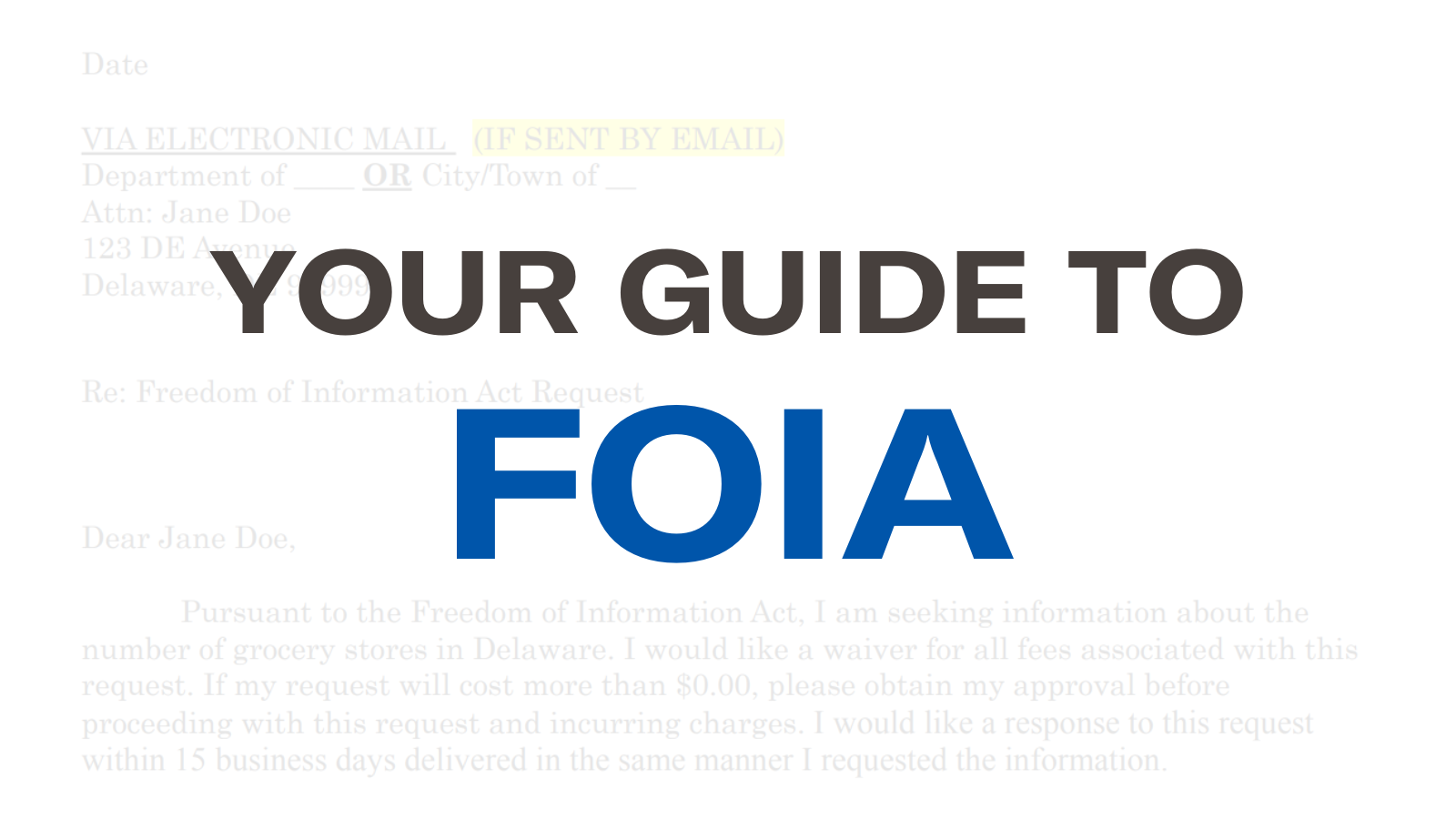By Jalyn Johnson, Policy Intern
What is the Freedom of Information Act (FOIA)?
The Freedom of Information Act, or FOIA, is designed to give the public the opportunity to observe the performance of public officials and agencies and monitor the decisions that they make. FOIA may not seem important, but it ensures that anyone can ask questions about their government, which ensures transparency in taxpayer-funded operations.
Community members have the right to ask questions such as: how much money the state parks earn annually, how many students are enrolled in public high schools, and even how many certified restaurants are in the state. Given that the United States is a democracy, the people of our democracy are entitled to information about the work the government carries out on their behalf. By using FOIA, citizens can ensure our government stays accessible and, even more, we have the power to improve the FOIA process and laws.
Delaware, like the other states and territories, has FOIA laws to ensure that the government is open and transparent with the public, and it is modeled after the federal government’s FOIA law passed in 1967.
The Beginnings of FOIA
Between the 1940s and 1989, during the early years of the Cold War, our government became increasingly more private in its affairs — which led California Representative John Moss to come up with the idea of what we now know as FOIA.
During this time in American history, being connected to communism was seen as treasonous. Even Moss was a victim of being associated with communism during his election run. Moss thought the government needed to be more open when 2,800 federal employees were fired due to ‘security reasons’ (Lemov and Jones, 2018), likely due to suspicions they were communists.
From 1955 to 1966, Moss was the driving force behind the Freedom of Information Act. Though President Lyndon B. Johnson and all federal agencies were opposed to the Act, Moss continued to fight. Regardless of the opposition from the federal agencies and the President, the Senate passed their version of the bill and the House of Representatives passed it with a 307-0 vote in 1966.
On July 4th, 1966, the 190th anniversary of the United States’ Declaration of Independence, Lyndon B. Johnson signed the FOIA bill into law, albeit reluctantly. President Johnson was worried about how FOIA would affect Presidential powers, however, then-White House Press Secretary Bill Moyers helped him change his mind. Typically, when a president signs a monumental bill like FOIA into law, there is a public event and those who propose the bill in the Senate or House receive a pen used to sign it, as a trophy for their work, but Johnson did neither. It is ironic that a bill meant to shed light on government actions was signed in private, rather than a public ceremony.
Nevertheless, Johnson emphasized that this bill “springs from one of our most essential principles: a democracy works best when the people have all the information that the security of the nation will permit… I have always believed that freedom of information is so vital that only the national security, not the desire of public officials or private collectors, should determine when it must be restricted” (Johnson, 1966). Johnson closed this statement with the large proclamation of “I signed this measure with a deep sense of pride that the United States is an open society.”
Delaware’s FOIA Law
The original version of Delaware’s FOIA law, SB 256, was introduced by Herman Holloway, Sr., who was the first Black person elected to Delaware's State Senate. SB 256 was also introduced by J. Donald Isaacs, Francis J. Kearns, Michael N. Castle, and David H. Elliott. Similar to the federal FOIA law, Delaware’s FOIA law had a complicated history as there were 7 amendments made until the General Assembly finally agreed upon the final version.
Delaware’s FOIA was enacted on July 26, 1976, with an effective date of January 1, 1977. Today, by law, Delawareans have the right to request and inspect public records.
All Delaware government entities have a FOIA coordinator who is required to help you identify and locate the public records that you are looking for. You can either fax, mail, e-mail, or fill out the appropriate FOIA request form for the department or public body of interest. After submitting your request, you should expect a response, a denial (with explanation), or a need for more time within 15 business days from the department of your choice.
Like all FOIA laws in the United States, Delaware does have exemptions when it comes to what can be requested such as, but not limited to, records that can be seen as an invasion of privacy like personnel, medical or student records; or specific records from certain government agencies. However, there is no limit to the number of FOIA requests you can submit as it is your right as a Delawarean!
How Do You Submit a FOIA Request in Delaware?
Submitting a FOIA Request is Easy!
- First, look to see if the information that you are interested in is publicly available; you can do this by looking on the website of the organization you’re researching, or even calling to see if they post this information anywhere the public can access.
- Decide who would be responsible for answering your question– the Department of Justice? The Department of Education? Or the Department of Health? Your local town?
- You can submit a FOIA request to any Delaware State Government Agency here.
- You can submit a FOIA request to any Federal Government Agency here.
- For local government agencies, you can submit a FOIA request through the locality’s website. You may also call the town or city and request to speak with the FOIA coordinator for more information on how to best submit your request.
- Send your FOIA request!! Delaware government departments are required to reply within 15 business days. If you need a sample of what your letter or email should look like see an example below!


